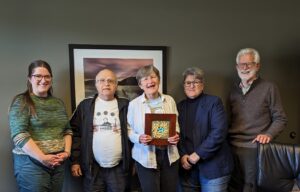
Iron Creek Preserve at closing (L-R) Susan LaCroix, Maan Abdulbaki, Sybil Kolon, Diana Kern, Steve Palms
Legacy Land Conservancy is pleased to announce the creation of Iron Creek Preserve in Manchester Township. The 79-acre property lies in the southwest corner of Washtenaw County situated in the heart of Legacy’s tri-county service area.
Legacy’s eighth nature preserve was made possible through the generosity of landowners and long-time land stewards Sybil Kolon and Maan Abdulbaki who donated their land so that future generations can experience the same beauty, serenity, and joy they have been so fortunate to enjoy.
“In 1948 my grandparents decided to leave the city, where they had built a successful business, to rehabilitate a rundown house and farm. They were not the coddling type, but I have to think they did it for their grandchildren,” Sybil Kolon said. “The relationship I formed with this land, coming out here as a kid from Detroit with many other cousins, helped define who I became.”
Sybil and Maan approached Legacy in 2014 with the intentions of leaving their property to Legacy as part of their estate plan. The original idea didn’t materialize as planned though, and gifting the land to Legacy as a nature preserve sooner rather than later turned out to be the best approach.
“One goal of mine is for this land to be a place where anyone can build a connection with nature, as I did,” Sybil said. “Giving this gift during our lifetime allows us to participate in the project and see our hopes come to fruition.”
Permanent protection of this land is significant as it helps to capture and store carbon, benefit water quality, and preserve critical wildlife habitat. It consists predominantly of forested rolling hills and includes 1000 feet of water front on Iron Creek, a tributary of the River Raisin.
The prominent oak-hickory forest captures a large amount of greenhouse gas emissions from the atmosphere and stores it in the soil, helping to mitigate climate change. Additionally, protecting the forested land and the Iron Creek frontage that flows through it, safeguards important and critical headwater of the River Raisin Watershed. What happens on the land here carries impacts for drinking water, wildlife, agriculture, recreation, and tourism throughout the Great Lakes Basin.
The preserve also features remnant oak savannah and pockets of wetlands, including the more unique remnant prairie fen and domed fen. Both of which are wetland types unique to the glaciated Midwest and considered vulnerable in the state of Michigan.
Prairie fens exist predominantly in southern lower Michigan and occur where cold, alkaline groundwater springs to the surface. The resulting conditions allow for the unique range of plant species seen in this natural community, and contributes to a wide range of habitats that support biodiverse vegetation, birds, fish, amphibians and terrestrial animals in the area.
Unique species such as yellow lady slippers (Cypripedium parviflorum), fringed gentian (Gentianopsis sp), eastern whip-poor-will (Antrostomus vociferus, state threatened), and eastern massasauga rattlesnake (Sistrurus catenatus, state threatened, federally threatened) call this property home.
The preserve is not yet open to the public. Legacy is tentatively working toward an opening in spring 2025, but an official date depends on raising the remaining funds for a stewardship endowment. Legacy is currently fundraising to cover ongoing management costs ensuring the preserve is responsibly managed forever. More than half has been raised by leveraging federal, state, and local funding sources, but over $400,000 is still needed. The public can help support Iron Creek Preserve fundraising efforts by donating here.
In the meantime, thanks to a grant from National Fish and Wildlife Foundation, staff is diligently working behind the scenes to ensure that when we do open the property to visitors, it is accessible and safe.
“Legacy is excited to welcome the public to Iron Creek Preserve in the near future,” Legacy Land Conservancy Preserve Stewardship Manager Kyler Moran said. “However, we must first ensure it is welcoming and has clear guidelines in place so that we can protect the sensitive nature of the fen as well as the safety of the public while on the property.”
Some immediate tasks in addition to trail prep, include hiring a bridge engineer to ensure the footbridge is safe for public use, delineating a parking lot, as well as installing an information kiosk, a detailed map, and a boot brush station.
Although the land is officially in Legacy’s care now, Sybil and Maan are not completely stepping away from the land. They live near the property and plan to be Eco Stewards, dedicated volunteers who help keep watch over the preserve as well as assist with critical projects as needed.
Two workdays to pull garlic mustard have already been scheduled–May 9 and May 23. Anyone interested in volunteering should sign up via this Google form
In addition to the National Fish and Wildlife Foundation grant, Legacy also received a grant from the North American Wetlands Conservation Act, managed through Ducks Unlimited, to cover the acquisition transaction costs.
“We’re so grateful to our many partners who have come together to see this project come to life,” Executive Director Diana Kern said. “This work takes many hands, and we’re proud to have the trust and funding from our partner organizations to share this unique and beautiful preserve with our community.”
More details about the workdays and all upcoming Legacy events can be found on our event calendar.
Farmhouse Deconstruction Project
The property contained a well-loved but beyond repair historic farmhouse that had to be removed before Legacy could accept the land donation. Sybil Kolon’s personal history with the house and her desire to keep it out of a landfill resulted in a special deconstruction project prior to the deed transfer. Sybil coordinated between Legacy Land Conservancy and Architectural Salvage Warehouse of Detroit to have the farmhouse taken apart by hand and salvage everything that could be reused. Sybil also worked with the Manchester Area Historical Society to organize a series of workshops about the process. For more information on the farmhouse deconstruction project, visit – https://mahsmi.org/dtp/
Click here for the press release
- Mayapples cover the forest floor
- Yellow lady-slipper (Cypripedium parviflorum)
- Blue lobelia flowering
- Spotted joe pye week, goldenrod, and aster flower in the prairie fen.
- White lady-slipper (Cypripedium candidum, state threatened)
- Rosinweed
- Bee on flowering spotted joe pye week.
- Land donor Sybil Kolon enjoying a walk through spotted joe pye weed, swamp thistle, and blue lobelia.
- The sun peeks through the tree canopy in the rolling forest.
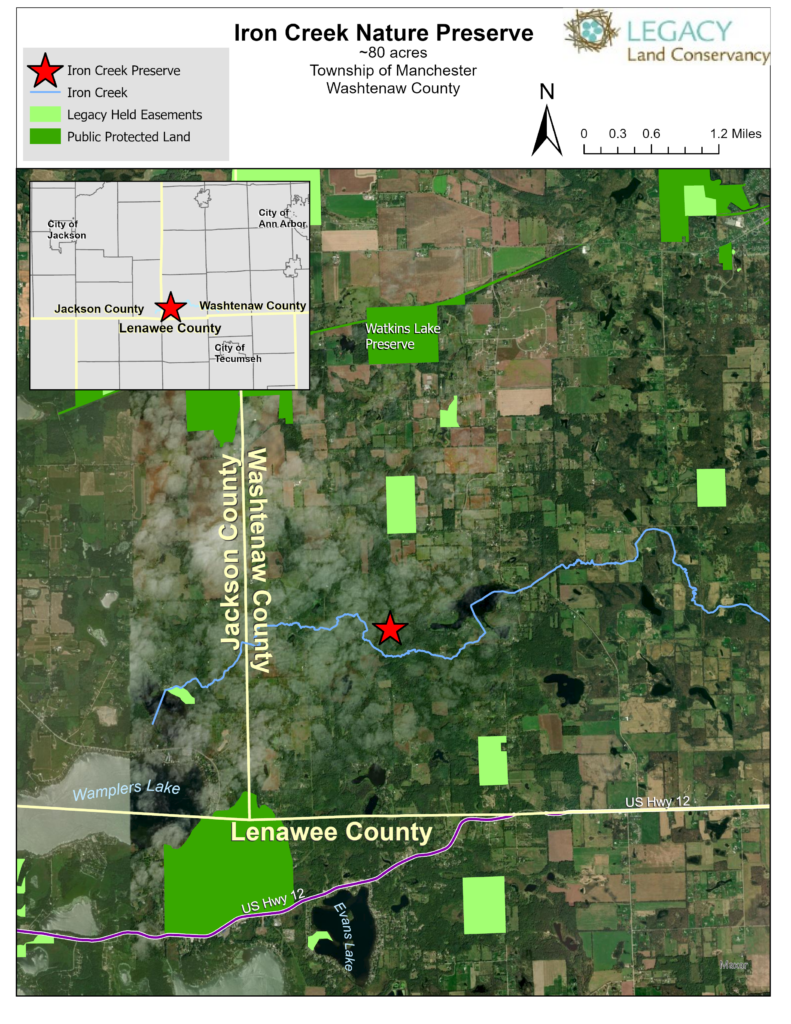

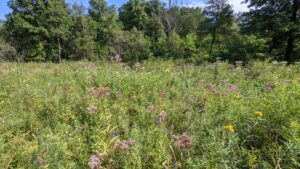
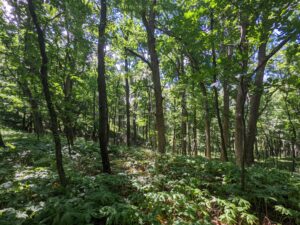
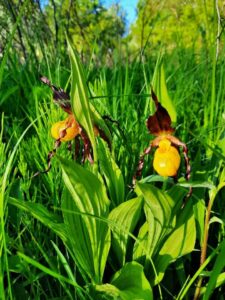

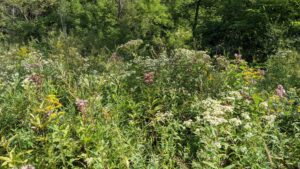

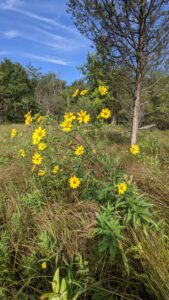

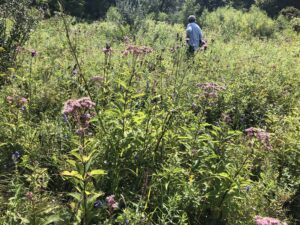

 RSS Feed
RSS Feed